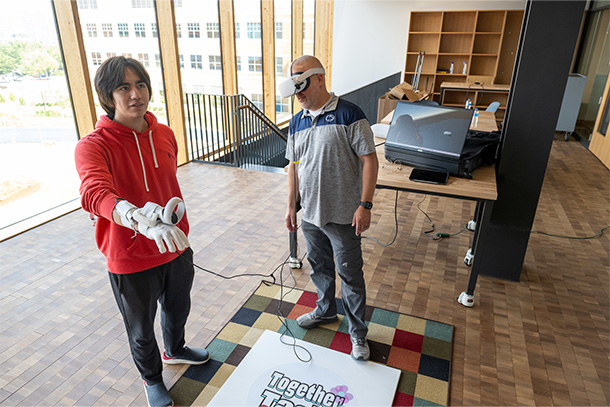
As an expansion on a capstone design project from spring 2022, a spring 2023 capstone design team further developed the tactile feedback and usability of a haptic, virtual reality device designed for low vision/blind individuals to partner with sighted individuals to create sculptures inspired by how both groups "see." Credit: Erin Baskin/Penn State
Engineering a "cornerstone-to-capstone" education
Client-sponsored, project-based learning experiences enhance undergraduate engineering education
November 9, 2023
By Samantha Chavanic
UNIVERSITY PARK, Pa. — As a leader in engineering education, the Penn State College of Engineering provides students with unique learning opportunities that replicate industry experiences and provide real-world context throughout their undergraduate careers.
Known as “cornerstone-to-capstone education,” this approach begins in EDSGN 100: Cornerstone Engineering Design, the first-year design course taken by most engineering students, where the foundational concepts of engineering are taught through hands-on team projects. These core skills are reinforced and expanded upon through students’ engineering curricula for the next three years, culminating in an open-ended, industry-sponsored capstone design project during their final year of study. Each semester, the Learning Factory coordinates the college’s capstone design projects, facilitating the largest multidisciplinary client-sponsored capstone program in the world.
Robert Rabb, associate dean for education in the College of Engineering, explains more about “capstone-to-cornerstone education” and the important role hands-on, client-based projects play in undergraduate engineering education at Penn State.
Q: Why is it important for the College of Engineering to offer this type of undergraduate learning experience to students?
Rabb: Students need to practice design to be competent. One hands-on design course at the end of the four-year program is not enough. Faculty have realized that design is better taught throughout the curriculum—it is experiential learning where skills and judgment grow with the student’s development. EDSGN 100 teaches foundational skills that will continue to be built upon, as they are fundamental concepts applicable across engineering disciplines.
Q: What makes the undergraduate engineering cornerstone-to-capstone experience at Penn State unique?
Rabb: We try to replicate what students will encounter in industry and provide industry-sponsored projects in a project-based learning setting. This provides real-world context and encourages the students to think beyond known solutions. The projects are beneficial because of intertwined layers of complexity, where design decisions have a ripple effect. Students need to address and solve issues that go beyond isolated textbook examples. Because these projects are done with a company that has real-world challenges and constraints, everyone is invested in the design solution. Research shows that students tend to feel more motivated and are inspired to do better when exposed to industry and a real-world ‘customer.’
Q: How are the skills taught in EDSGN 100 applied and built upon throughout the undergraduate experience?
Rabb: In addition to increased technical skills and knowledge gained from the classroom experience, students in cornerstone-to-capstone courses exercise open-ended problem solving, multidisciplinary teamwork, report writing and oral project presentation. These projects emphasize the role engineers play in society—improving the life, safety, health and welfare of the global community.
Q: How do our facilities support the cornerstone-to-capstone learning experience?
Rabb: The Learning Factory is home to the cornerstone-to-capstone design experience in the new Engineering Design and Innovation Building. It is a hands-on facility for engineering students to use in EDSGN 100, for their capstone design project, and other courses as well as research projects and student organization work. The Learning Factory provides modern design, prototyping and manufacturing facilities, including machining (CNC and manual), 3D printing, welding, metrology and CAD/CAM.
Q: How does the capstone experience better prepare students for their future engineering careers?
Rabb: The capstone experience allows students to work on a multidisciplinary engineering team, much like they will do in their careers. Each capstone experience provides ample opportunity for students to draw on and apply materials learned in previous courses. The courses are intended to simulate a real-world design experience. Therefore, designs must consider performance objectives, costs, environmental impacts and legal ramifications. In some courses, the students must develop materials to justify their design decisions to regulatory agencies and the public. Ethical questions concerning relationships with clients, regulatory agencies and other professionals also are considered as well as global and contemporary issues.
Q: Why is it important to partner with industry leaders for the capstone learning experience? What unique opportunities does this provide to students?
Rabb: Most engineering students will work in industry after they graduate. It is so important for students to have the exposure and understanding of industry practice and culture instead of simply recognizing or comprehending ambiguous concepts from textbooks, while still in their academic development timeline. It allows them to be successful later after their senior capstone design projects, and in their future engineering careers. It closes the distance from subjective classroom experiences to real-world situations.



